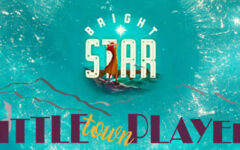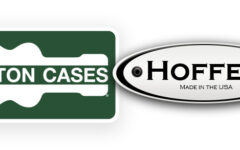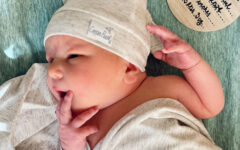Sandy Rothman sent us this lovely tribute to, Roosevelt Watson, a noted figure in the Bay area of California. He served as a mentor for many who sprang from the bluegrass scene there, several of whom (Sandy included) went on to leave quite a mark of their own. Watson passed away earlier this month.
 An Arkansas native born in the rugged and mountainous Ozarks, second youngest in a family of 8 children, Roosevelt grew up in the country with a great love of hunting and fishing, especially with his older brother Searl and uncle Andy. He listened to the 1930s Monroe Brothers and the 1940s Blue Grass Boys on the radio and always loved oldtime fiddling and country music, “but when I heard Bill Monroe with Lester Flatt, Earl Scruggs, and Chubby Wise, that did it for me. I was hooked.” Later he also became very fond of the Stanley Brothers.
An Arkansas native born in the rugged and mountainous Ozarks, second youngest in a family of 8 children, Roosevelt grew up in the country with a great love of hunting and fishing, especially with his older brother Searl and uncle Andy. He listened to the 1930s Monroe Brothers and the 1940s Blue Grass Boys on the radio and always loved oldtime fiddling and country music, “but when I heard Bill Monroe with Lester Flatt, Earl Scruggs, and Chubby Wise, that did it for me. I was hooked.” Later he also became very fond of the Stanley Brothers.
World War II interfered with his musical interests. Serving in the Army Air Corps, he survived the horrific Bataan Death March (“67 men in my unit died and I buried every one of them”) and 42 months as a Japanese POW, enduring unimaginable torture and deprivation. When he was finally liberated at the war’s end and found his way back home to Arkansas, he said many old friends didn’t believe they were seeing him. They were sure he had died.
It took him awhile to find himself. Having driven long-haul trucks for the CCC (Civilian Conservation Corps) before and after the war in Arkansas (“the CC camps were the best thing that ever happened to me”), Roosevelt moved to California in 1946, first taking a job with Pabco, a linoleum manufacturing plant in Emeryville/Oakland. In 1951 he went to work for Myers Drum, a facility that cleaned and refurbished steel drums. It was a Teamster shop and he became the shop steward, involved for many years with employee/union matters and contract negotiations; Myers became a division of Kaiser Steel, from whom he retired in 1983. At the time, Roosevelt may not have known that his “main man” in bluegrass, Bill Monroe, had likewise cleaned barrels and steel drums for Sinclair Oil at Whiting, Indiana, in the early 1930s. (In that same decade, Roosevelt had worked in the nearby Illinois oilfields.)
One day in 1949, visiting his parents back home in Harmony, where he was born near Swain, Newton County, in the beautiful high country of the Ozark National Forest near the communities of Nail and Deer, he heard Monroe announce on the radio that he’d be appearing at a Ft. Smith drive-in theater (some 80 miles away) “with my new guitar picker and singer, Jimmy Martin.” Roosevelt says he called his Pabco boss in Oakland right away and told him he was going to the show and didn’t know exactly when he’d arrive back at work. “If my job is waiting for me when I get back, fine; if not, that’s fine too,” he says he told his boss. It was a tone conveying not a carefree attitude towards his job but rather the importance of seeing that band. “I was deer-hunting with some friends of mine when I heard the news on the radio, and one of them was a big bluegrass fan. I told him to come with me, but he didn’t. Later on, he said he sure wished he had.” Roosevelt was the first to arrive. “I drove up and got a front-row parking place. I wasn’t 20 feet from where they played. Watched the show outside my car, sitting on the fender. Man, it was fantastic. The best I ever heard.” The version of the Blue Grass Boys he saw was Bill’s classic early 1950s band with Jimmy Martin, Rudy Lyle, Vassar Clements, and Joel Price. He met Bill that night and they remained friends from then on.
Roosevelt still had his job when he drove back to California.
He and Winnie married in 1953; their two daughters are Kathy and Teresa, and they have four loving grandchildren living in Virginia, Texas, Oregon, and California, and six great-grandchildren in Texas and Washington. Another strong and self-reliant Arkansas native from a mountain farm near Roosevelt’s home area, Winnie too had relocated to California, before they were married. She retired from Pacific Bell after 39 years of dedicated service. Over the years Winnie, Roosevelt, and the girls made 37 driving trips back to Arkansas to visit family. Always completely devoted to her husband, Winnie loves to remember feeding him as he drove across and being in charge of playing their bluegrass tapes all the way. For his part, Roosevelt never failed to compliment Winnie’s expert country-style cooking and, really, everything she did.
 For many years from the early ’60s through the ’80s, whenever Bill Monroe came to town, the very first thing he would always ask me was, “Where’s Roosevelt Watson?” They saw each other at various Bay Area shows in the mid-’50s, including Bill and Charlie Monroe’s 1955 West Coast reunion tour. In 1959 the Monroe band (Jack Cooke, Bobby Hicks, Robert Lee “Buddy” Pennington, and Bessie Lee Mauldin with her little dog) visited the Watsons at their Albany home on the day of a show at a small San Pablo Avenue bar, the 1902 Club in Oakland. In the afternoon Winnie took Bessie and the band shopping in San Francisco and out to Playland-at-the-Beach, an historic amusement park, while Bill stayed home and visited with Roosevelt, who said he played Bill some of his records he hadn’t heard before. (Some might’ve been LP releases he hadn’t seen yet.) Winnie always remembers Jack Cooke dedicating Cash On the Barrelhead to her at the show that night. She herself is a lifelong fan and close listener to Bill Monroe, the Stanley Brothers, the Louvin Brothers, and especially Hank Williams. She knows when Wheel Hoss isn’t played right on the mandolin, and isn’t afraid to say so!
For many years from the early ’60s through the ’80s, whenever Bill Monroe came to town, the very first thing he would always ask me was, “Where’s Roosevelt Watson?” They saw each other at various Bay Area shows in the mid-’50s, including Bill and Charlie Monroe’s 1955 West Coast reunion tour. In 1959 the Monroe band (Jack Cooke, Bobby Hicks, Robert Lee “Buddy” Pennington, and Bessie Lee Mauldin with her little dog) visited the Watsons at their Albany home on the day of a show at a small San Pablo Avenue bar, the 1902 Club in Oakland. In the afternoon Winnie took Bessie and the band shopping in San Francisco and out to Playland-at-the-Beach, an historic amusement park, while Bill stayed home and visited with Roosevelt, who said he played Bill some of his records he hadn’t heard before. (Some might’ve been LP releases he hadn’t seen yet.) Winnie always remembers Jack Cooke dedicating Cash On the Barrelhead to her at the show that night. She herself is a lifelong fan and close listener to Bill Monroe, the Stanley Brothers, the Louvin Brothers, and especially Hank Williams. She knows when Wheel Hoss isn’t played right on the mandolin, and isn’t afraid to say so!
Within the next year or so, having been unaware of the Oakland club date, I met Roosevelt for the first time at Campbell Coe’s Campus Music Shop near the UC Berkeley campus, where many early folkies and bluegrassers met. A record collector since the days of the 78—as they were released he would mail-order new bluegrass and some country 78s, 45s, and LPs from the Jimmie Skinner Music Center in Cincinnati—Roosevelt invited me to his house where he’d spin all the great ones. As he reminisced recently with some pride, “I’ll never forget—you and Rick Shubb used to come over and take turns playing that Mastertone banjo I had back then…and you both made good banjo pickers.” Raised in a musically rich part of Arkansas where “almost everybody fiddled and some played banjo,” Roosevelt could play a few tunes in the oldtime clawhammer banjo style but said, “I was never able to get my fingers limber enough for 3-finger-picking.”
Earlier, in the ’50s, it hadn’t taken long through the local network of displaced Ozark natives for Roosevelt to hook up with Vern Williams and Ray Park; they were musical companions for many years until Roosevelt sustained workplace injuries to his back that limited his mobility (to get out to shows and sessions) but never his passionate interest in bluegrass. Roosevelt told of meeting other transplanted Ozark folks in the Bay Area. “One night along about eight o’clock somebody knocked on my door and asked if I was Roosevelt Watson. It was James Henley [an Oklahoma fiddler and big fan of the Stanley Brothers, like Roosevelt]. He said he’d seen my name on a banjo case at Meni-Ketti’s music store in downtown Oakland, where I bought my Mastertone, and they gave him my address. He said, ‘I figured anybody who was buying that banjo must love bluegrass music.’ So we became friends from that time on.” Henley also had a mandolin-picking nephew named Bert Johnson, who began playing in a band with me and Rick.
In May of 1963 Roosevelt taped Bill Monroe’s Berkeley concert (his classic ’60s band with Del McCoury, Kenny Baker, Bill Keith, and Bessie Lee), a show that became a cornerstone in every local aficionado’s tape collection.
You might say he knew as much about bluegrass as any musician, remembering the names of the old traditional players and who they worked with (especially banjo pickers and fiddlers) the way sports fans know who played with who and when. In later years he kept up with local bluegrass radio shows, taping them and culling through later for “a song I haven’t heard,” not an easy thing for him to find. He especially liked “a song that tells a good story.” Roosevelt loved making tapes for anybody who was interested, sometimes calling himself “the bluegrass preacher.” It could be that his tapes of the ’60s (passed from me to Jerry Garcia, who later encouraged his fans to tape shows) contributed to the emergence of the term “taper” and the practice of sharing live shows. Certainly his lifelong devotion to the music and his strong belief in sharing served as a model for us.
A number of years ago I recall Roosevelt telling me excitedly that he’d discovered there was a neighbor near his and Winnie’s neat house in Albany, California, who liked bluegrass music. Naturally he made him some bluegrass cassette tapes…but he also said he wished there was a way that every time he played a record it could be automatically sent over to this guy’s house—like with tin cans and wire. “Nobody loves good bluegrass music any better than I do,” he said. “Whenever I hear something good, I always wish everybody who likes that kind of music could hear it too.” Roosevelt always did his part to make that happen.
A stroke and heart attack in October of 2009 further limited his movement, though he kept up his exercise using a walker. “I haven’t had a speeding ticket yet,” he said in his ever-positive and optimistic manner that’s been an inspiration to me for the past 50 years. After a brief hospitalization Roosevelt, a man of faith, went peacefully to his eternal rest on April 8, 2011. He was preceded in death by his parents Tom and Trissie Watson, brothers Grant and Paul, and sisters Nancy, Martha, and Mary. Survivors include his beloved wife Winnie, brother Searl Watson (100), sister Golda Adams (93), daughters Kathy Bain (Chuck) and Teresa Zirlen (Rich), four grandchildren (Carolyn, Kelly, Sean, and Patrick), six great-grandchildren (Jeremy, Brian, Brandon, Rachael, Charles, and Katherine), and many nieces and nephews.
Interment was on April 14 at Sunset View Cemetery, El Cerrito, California, with full military honors. At the graveside Butch Waller, Larry Cohea, Bert Johnson, and I played an instrumental version of Will the Circle Be Unbroken as the casket was lowered.







